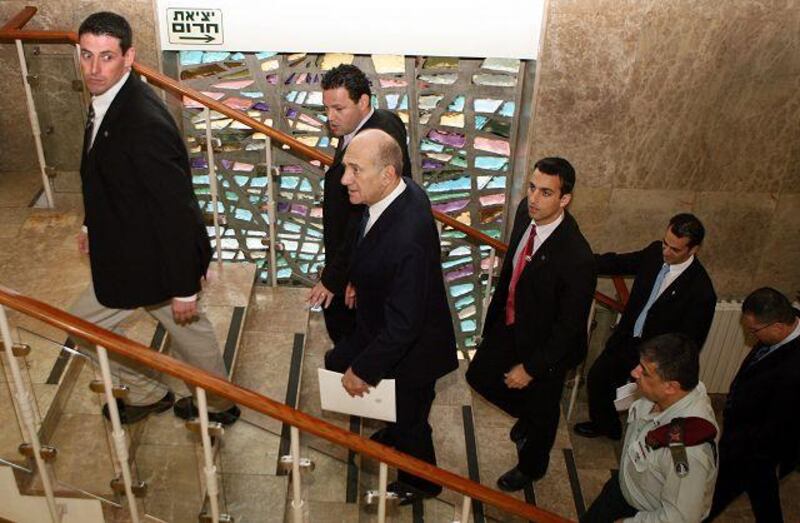TEL AVIV // In a last-ditch effort to reach a deal with Hamas on the release of an abducted Israeli soldier, Ehud Olmert, Israel's outgoing prime minister, is convening a special cabinet meeting today after dispatching two top negotiators to Egypt during the weekend to speed up talks on a prisoner exchange. Mr Olmert on Saturday sent Yuval Diskin, head of Israel's Shin Bet, the internal security service, and Ofer Dekel, a senior negotiator on prisoner swaps, for talks in Cairo, which is mediating between Israel and Hamas. The two were due to return last night to brief Mr Olmert on any progress.
Israeli media reported yesterday that the envoys were likely to warn Hamas that if the group does not agree to a deal now, it may soon encounter a new Israeli government that will probably be much less flexible on exchanging prisoners. Possibly this week, Israel is expected to usher in a new governing coalition made up of mostly hardline parties. Mr Olmert, speaking yesterday in what he predicted would be his last regular weekly government meeting, said: "Over the weekend, I held a series of discussions regarding the efforts that we are making in order to exhaust the possibility of bringing about the release of ? Gilad Shalit." He added that the cabinet today "will make, based on the information that we will receive, such decisions as need to be made".
While Mr Olmert's comments spurred speculation of progress on a possible prisoner exchange, some Hamas officials yesterday insisted they would not give in to Israeli pressure. Fawzi Barhoum, a spokesman for the group in Gaza, was quoted as saying: "We don't have anything new on this issue. We are not planning to change our stances." Until late last week, the talks to free Sgt Gilad Shalit appeared stuck.
It was not clear yesterday how many of the hundreds of Palestinian prisoners whom Hamas has demanded be released would be let go by Israel in exchange for Sgt Shalit, who was kidnapped in a cross-border raid into Israel by Palestinian militants from the Hamas-ruled Gaza Strip in June 2006. Some of the prisoners on the list had been convicted for murdering dozens of Israelis, and in the past Israel has balked at freeing them. According to the left-wing newspaper Haaretz, a key dispute in the talks appears to be Israel's insistence on forbidding several dozen of the prisoners from returning to their homes in the West Bank or Gaza because of fears they would renew their attacks after their release. Instead, Israel demands they be expelled to Syria, Lebanon or other countries. Hamas, according to the paper, is only open to the expulsion of a few individual inmates.
Amid reports yesterday that Israel may have given in to Hamas's demands, some Israeli commentators criticised Mr Olmert for advancing a pact that is not in the country's favour. "I would be very, very surprised if all of a sudden a deal comes about that is good for Israel and not just for Gilad Shalit," said Roni Daniel, the veteran military analyst for Channel 2 TV. He said Israel should have pressured Hamas more, either through military actions or by a tougher handling of the Palestinian prisoners it holds, instead of acting "like a defeated country" in the negotiations.
Mr Olmert's 11th-hour bid to clinch an agreement may be partly attributed to an intensive public campaign by Sgt Shalit's family. A protest tent put up by the soldier's parents a week ago in front of the prime minister's residence has attracted much local media attention and has drawn thousands of visiting supporters, including government ministers, urging Mr Olmert to reach an accord before his term ends.
However, Mr Olmert's motivation to act may have stemmed from more than just the family's pressure. Some commentators said the veteran Israeli politician, forced to resign his post amid corruption investigations, is trying to salvage his image by at least appearing to launch an attempt to reach an accord that would be supported by many Israelis. In the cabinet meeting yesterday, Mr Olmert fended off criticism that he should have acted much sooner to have Sgt Shalit freed. He said: "I would like to point out that over the past three years we have made unceasing ? considerable, wide-ranging and complex efforts on various channels, some of them hidden, most of which were known to two or three people only."
Mr Olmert also took advantage of the cabinet meeting to ward off charges that his government failed to make any tangible progress with the Palestinians in peace talks that were renewed in the US-supported Annapolis summit in Nov 2007. Instead, he blamed the western-backed Palestinian Authority, led by Mahmoud Abbas. The failure "is, first and foremost, the result of the Palestinian leaders' weakness, lack of will and lack of courage in reaching an agreement," he said.
Palestinian officials attacked Mr Olmert for his remarks. "What Olmert says is entirely false. The proposals [during the talks] did not include conditions for the creation of an independent Palestinian state on all Palestinian territory occupied in 1967 with East Jerusalem as its capital," Nabil Abu Rudeina, a spokesman for Mr Abbas, told Agence France-Presse. vbekker@thenational.ae





